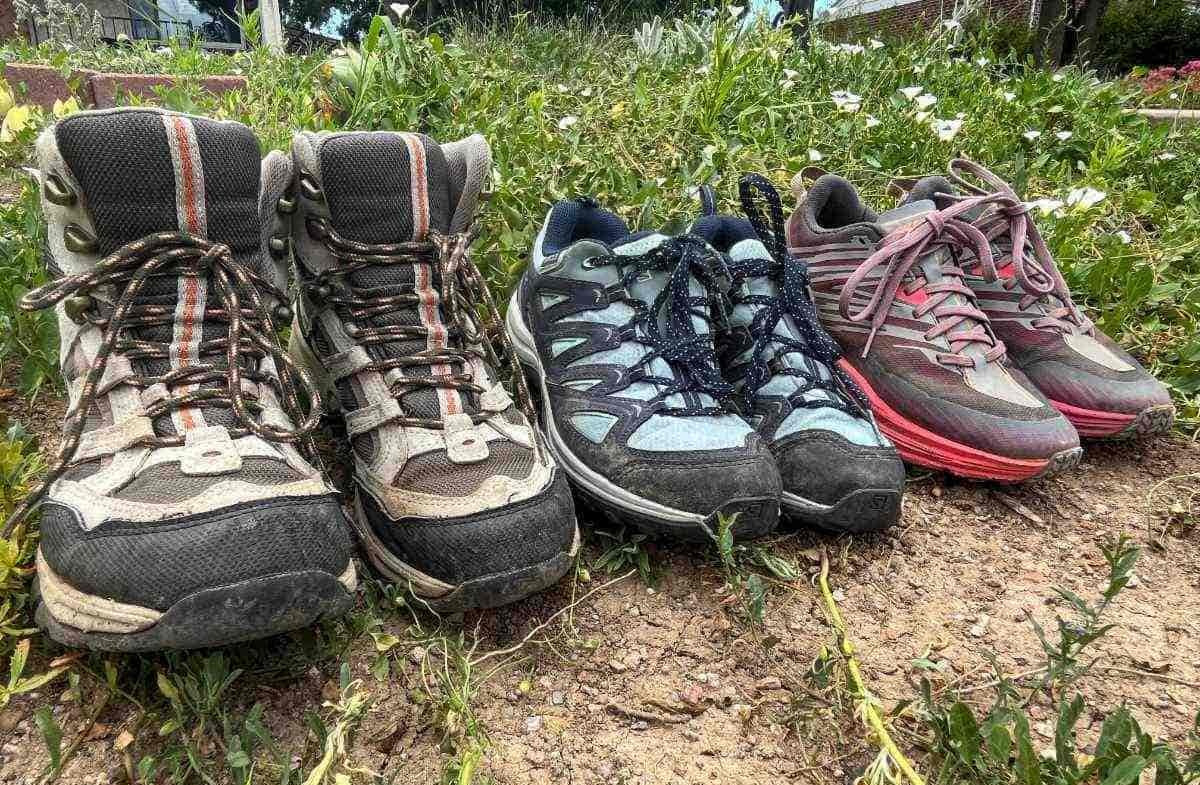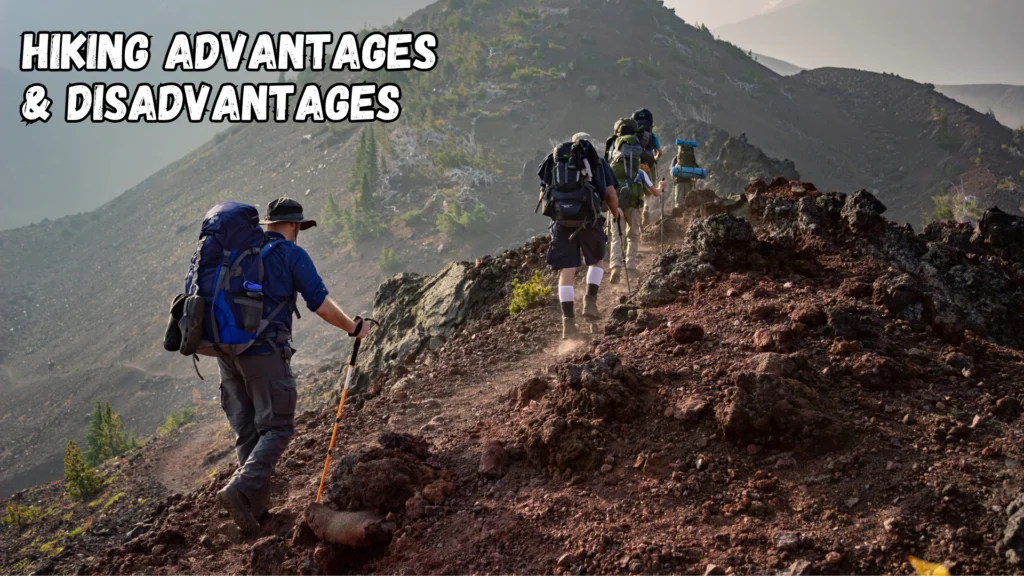Hiking boots provide ankle support, stability, and protection for rugged terrains, making them ideal for heavy backpacking and challenging trails. Hiking shoes offer a balance of support and flexibility suitable for moderate terrains and day trips.
When you’re heading into the wilderness, one of the most important decisions you’ll make is selecting the right footwear. Whether you’re embarking on a multi-day backpacking trip, a moderate hike, or a trail run, choosing between hiking boots, hiking shoes, and trail runners can impact your comfort, performance, and safety.
Understanding Your Options
- Hiking Boots:
Hiking boots are designed for rugged terrains and provide substantial ankle support, making them ideal for heavy loads and challenging environments. - Hiking Shoes:
Hiking shoes offer a middle ground, with more flexibility than boots while still providing support for moderate terrains. They are lightweight and breathable, ideal for day hikes. - Trail Runners:
Trail runners are the lightest and most flexible option, perfect for fast-paced hikes or trail running on well-maintained paths. Their agility makes them a favorite among ultralight backpackers.
Hiking Boots: The Best Choice for Rugged Terrain and Stability
Hiking boots provide unmatched durability and protection. They are the ideal choice for hikers carrying heavy packs over rough, uneven terrain.
- Durability: Constructed with sturdy materials, hiking boots can withstand tough environments and last for years, making them a solid investment.
- Ankle Support: Their high-cut design offers superior ankle protection, helping prevent sprains and injuries when traversing rocky or uneven surfaces.
- Traction: The rugged soles ensure superior grip, especially on slippery or muddy paths, giving you the confidence to take on difficult terrain.
Hiking boots are indispensable for hikers who prioritize stability, protection, and support on challenging treks.
When to Choose Hiking Boots:
- Rough Terrain: Hiking boots are ideal for rocky, uneven, and steep trails where extra ankle stability is crucial.
- Heavy Loads: If you’re carrying a heavy backpack, the robust support of hiking boots can help reduce foot and leg fatigue.

Credit: m.youtube.com
Hiking Shoes: A Balance of Flexibility and Support
Hiking shoes provide a versatile option for those who want more mobility without sacrificing stability. They strike a balance between comfort and protection, making them ideal for moderate hikes.
- Lightweight: Unlike heavy-duty boots, hiking shoes are designed for easier movement, reducing fatigue on long day hikes.
- Flexibility: With their more flexible soles, these shoes allow your feet to move naturally, making them a comfortable choice for moderate trails.
- Breathability: Many hiking shoes feature mesh panels that enhance ventilation, keeping your feet dry and cool during long hikes.
When to Choose Hiking Shoes:
- Day Hiking: For shorter hikes on well-maintained trails, hiking shoes offer sufficient support while being lightweight.
- Moderate Terrain: When dealing with occasional roots or rocks but not intense elevations, hiking shoes provide the right amount of protection and traction.
Trail Runners: Agility and Speed for Fast-Paced Hikes
Trail runners are designed for speed and agility, making them perfect for fast hikes and trail running. Lightweight and flexible, they allow hikers to cover more ground with ease.
- Versatility: Trail runners are incredibly versatile, suitable for hiking, running, and casual outdoor activities.
- Comfort: With cushioned midsoles and breathable uppers, trail runners ensure maximum comfort, even during intense activities.
- Agility: Their low-profile design and sticky rubber outsoles provide superior grip on well-maintained or flat trails, making quick, nimble movements easier.
When to Choose Trail Runners:
- Ultralight Backpacking: For those who prefer traveling light, trail runners reduce the strain on your feet and let you cover more distance with less effort.
- Trail Running: If you like to mix trail running with hiking, trail runners offer the perfect combination of lightweight construction and support.

Credit: www.treelinereview.com
When To Choose Hiking Boots
Choosing between hiking boots, hiking shoes, and trail runners depends on the type of terrain and the weight of your pack. Hiking boots provide ankle stability and protection for rugged terrain, while hiking shoes are lighter and offer more flexibility for easier trails.
Trail runners are suitable for well-maintained trails and are the lightest option for minimalists.
When to Choose Hiking Boots Choosing the right footwear for hiking is crucial for a comfortable and safe outdoor adventure. Hiking boots are ideal for certain situations where their durable construction and ankle support are beneficial. Knowing when to choose hiking boots over hiking shoes or trail runners can make a difference in your hiking experience.
Challenging Terrain
Hiking boots are recommended for traversing challenging terrains such as rocky paths, steep inclines, and rough trails. The robust ankle support and sturdy sole of hiking boots provide stability and protection, reducing the risk of ankle injuries on uneven and rugged surfaces.
Heavy Loads
When carrying heavy loads or backpacking for extended periods, hiking boots offer essential support and stability. The solid construction and added foot and ankle support of hiking boots are designed to carry heavier weights, reducing fatigue and minimizing the risk of foot and leg injuries when trekking with a substantial pack. By choosing hiking boots for challenging terrains and heavy loads, hikers can ensure their safety and maintain comfort throughout their outdoor excursions.
When To Choose Hiking Shoes
Day Hiking
For short adventures on well-maintained trails, hiking shoes provide the right balance of support and flexibility.
Moderate Terrain
When you’re tackling moderate terrain with occasional rocks and roots, hiking shoes offer protection and grip.

Credit: m.youtube.com
When To Choose Trail Runners
Looking for hiking footwear? Consider trail runners as a versatile option in comparison to traditional hiking boots or shoes. Their lightweight design and flexibility make them suitable for various terrains and activities, providing comfort and stability on your outdoor adventures.
Trail runners are a lightweight and versatile footwear option for hikers looking to cover ground quickly and comfortably. They are especially suited for certain conditions and activities. Here, we will explore two specific scenarios where choosing trail runners over hiking boots or hiking shoes is advantageous: Ultralight BackpackingTrail Running.
Ultralight Backpacking
For hikers who prioritize traveling light, whether for speed or efficiency, trail runners are an excellent choice. Their lightweight construction helps reduce overall pack weight, enabling hikers to cover more ground with less effort. With less strain on the feet and legs, hikers can enjoy longer distances and extended trips without sacrificing comfort. Furthermore, the flexibility of trail runners allows for a more natural stride, making them ideal for minimalist and ultralight backpacking adventures.

Trail Running
Trail runners are designed for speed and agility, making them the perfect choice for hikers who enjoy mixing hiking and trail running. These shoes provide a lightweight and responsive alternative to hiking boots or shoes, allowing hikers to tackle rugged terrain with greater ease. Featuring a blend of cushioning, support, and traction, trail runners excel in providing the necessary grip and stability required for quick movements on uneven surfaces. Whether you’re trail running intermittently during your hikes or seeking to cover long distances at a brisk pace, trail runners offer the necessary performance and comfort. In summary, trail runners are highly versatile footwear options that excel in specific scenarios. When engaging in ultralight backpacking or combining hiking with trail running, choosing trail runners will elevate your outdoor experience. Their lightweight design and responsive features allow for increased speed, comfort, and maneuverability on various terrains. So, the next time you head out on the trails, consider reaching for a pair of trail runners to enhance your hiking adventure.
Check Your Necessary Essential Hiking Checklist
Key Considerations for Choosing the Right Footwear:
When deciding between hiking boots, hiking shoes, and trail runners, consider the following factors:
- Terrain:
Choose your footwear based on the terrain you plan to cover. Rugged, rocky trails demand the extra protection of hiking boots, while smoother, well-maintained paths are perfect for trail runners. - Distance and Duration:
Longer hikes, especially with a heavy pack, benefit from the added support of hiking boots. For shorter, less intense hikes, hiking shoes or trail runners may be more comfortable. - Weather Conditions:
Waterproof hiking boots are great for wet, muddy conditions, while the breathability of hiking shoes and trail runners keeps your feet dry in warm climates. - Personal Preference:
Ultimately, comfort is key. Make sure to choose the footwear that feels best for your foot type and hiking style.
Choosing the right footwear for hiking is crucial for safety, comfort, and performance. Hiking boots offer excellent ankle support and protection in rugged terrains. Hiking shoes are versatile and lightweight, perfect for easy to moderate trails. Trail runners are ideal for experienced hikers seeking speed and agility on well-maintained paths.
Ultimately, the best choice depends on personal preferences, terrain conditions, and hiking style. Happy trails!
FAQs:
Are Trail Runners The Same As Hiking Shoes?
Trail runners are designed for running on off-road trails, providing agility and speed. Hiking shoes offer more support and durability for long hikes over rugged terrain. They serve different purposes.
Can I Use Hiking Shoes For Trail Running?
Yes, you can use hiking shoes for trail running if they provide proper support and traction. It’s essential to choose shoes that are comfortable and designed for the terrain you’ll be running on to prevent injuries.
Is There A Difference Between Hiking Shoes And Hiking Boots?
Yes, hiking shoes are lighter and more flexible, while hiking boots provide more ankle support and protection.
Are Trail Running Shoes Good For Climbing?
Trail running shoes can be suitable for climbing due to their traction and stability. They provide good grip on various terrains, enhancing performance during climbs. The durable construction and lightweight design make them a practical choice for outdoor activities.



Pingback: 5 Best Hoka Hiking Boots for 2025